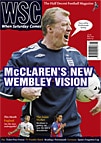 Lyon attempt to cement their domestic dominance by floating on the stock market. Steve Menary reports
Lyon attempt to cement their domestic dominance by floating on the stock market. Steve Menary reports
Olympique Lyonnais dominate their domestic scene in a manner few can match. They have won the past five French titles and are on their way to a sixth, 16 points clear with nine games left at time of writing. Yet though they are routinely tipped as potential Champions League winners, Lyon have always fallen short. To provide a bigger challenge to English, Spanish, Italian and German clubs, they want to quit the 42,000-capacity Stade Gerland and move to a new stadium seating 60,000 and costing €300 million (£200m). They decided a stock-market flotation was the best way to finance the move. But why did the European Commission, which is interested in promoting greater ownership of clubs by fans, force the French government to change the law in order to help Lyon out?
Gérard Houllier’s employers are certainly profitable, making £11m on a turnover of £112m in the year to June 2006, but those in charge do not seem to have done much research into what happens when clubs float on the stock market. Many Norwegian clubs listed disastrously in the 1990s, but an even more salutary example for Lyon is just across the Channel. From Tottenham to Swansea, 27 British clubs floated publicly and it proved a catastrophe for many (Money Go Round, WSC 230). Shares collapsed in value and/or left clubs open to predatory takeovers, from the Glazers at Manchester United to Vladimir Romanov at Hearts.
The trend towards ownership of UK clubs by foreign billionaires is the exact opposite of the structure recommended in an independent review of European football sponsored by the EC and UEFA. The brainchild of UK Sports Minister Richard Caborn and carried out by José Arnaut, who used to hold the same post in Portugal, the review recommends greater fan ownership of clubs (Cap That Fits, WSC 233).
Achieving that goal is not going to be made any easier by the EC forcing national governments into changing laws put into place to protect club ownership structures. Lyon argued that a 1999 French law banning sports clubs from listing is not compatible with the European Union’s free-market ideals. Facing a clash with the EC, the French backed down a year ago on the condition that any money raised is used for capital projects and not just paying players’ inflated wages.
Lyon wanted to raise around €100m (£68m) and offered up 3.7m shares – or 28 per cent of the ownership of the club – to the stock market. Lyon chairman Jean-Michel Aulas kept a majority stake, while cinema company Pathé now owns around a third, with the rest held by investors.
Before the float, the shares were expected to be priced between €21 and €24, but demand proved strong and the shares were listed at the top end of this range, only to fall after Lyon were eliminated from the Champions League at the quarter-final stage.
That is a salutary “welcome to the plc world”, but Lyon’s listing could tempt other French clubs to follow. Late last year, a team of banks bought Paris Saint-Germain for £28m from TV company Canal Plus. They could see a future for PSG on the markets, although only Lyon have so far spoken to the national FA about flotation. The stake that Lyon listed is also only a minority, but even in Germany, where the majority of a club has to be owned by the members, small-scale flotations have yielded poor results for the two clubs to have tried it, Borussia Dortmund and Eintracht Frankfurt.
“What’s happened at Lyon is not the end of the world, but these sort of things tend to set a precedent,” says Dave Boyle, deputy chief executive of Supporters Direct. “And it goes against the review, which sets out a model for sporting ownership.” SD is a successful UK quango backed by Caborn to help fans’ groups take stakes in clubs – just what Arnaut’s review recommended. To further these recommendations, a European conference is being held in June next year at the Emirates Stadium. Despite regular contact with fans’ groups from Germany to Greece looking to expand the model pioneered in the UK, SD has not heard from any French supporter groups. Now, perhaps more than ever, they need to.
From WSC 243 May 2007. What was happening this month